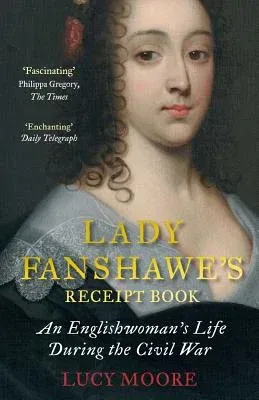Lucy Moore
(Author)Lady Fanshawe's Receipt Book: An Englishwoman's Life During the Civil War (None)Paperback - None, 1 October 2018

Qty
1
Turbo
Ships in 2 - 3 days
In Stock
Free Delivery
Cash on Delivery
15 Days
Free Returns
Secure Checkout

Print Length
432 pages
Language
English
Publisher
Atlantic Books (UK)
Date Published
1 Oct 2018
ISBN-10
1782398120
ISBN-13
9781782398127
Description
Product Details
Author:
Book Edition:
None
Book Format:
Paperback
Country of Origin:
US
Date Published:
1 October 2018
Dimensions:
19.81 x
12.45 x
3.3 cm
Genre:
17th Century
ISBN-10:
1782398120
ISBN-13:
9781782398127
Language:
English
Pages:
432
Publisher:
Weight:
417.3 gm